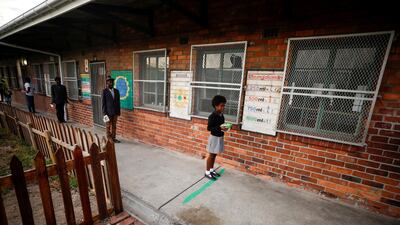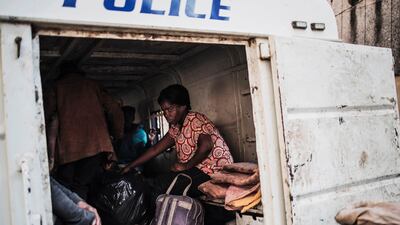As few as one fifth of pupils sent home from schools by the coronavirus shutdown are accessing continuing education efforts in a number of African countries, according to ministers involved in a conference call on the issue.
More than a dozen ministers exchanged views in a webinar on Thursday organised by the Global Partnership for Education (GPE), an initiative backed by the World Bank. Fears that children will be permanently denied an education were a common theme, even though many states were able to switch quickly to remote learning modes of operation.
The legacy of a year long shut down of schools in the 2013 ebola crisis stood some parts of the continent in good stead but others said the systems needed strengthening.
Radio has turned out to be the mainstay of the response as ministries develop classroom-style programmes for children and their families to access.
Liberia is one country that has turned to radio broadcasts. Ansu Sonii, the country's education minister, explained the challenges posed by the crisis. "We had the experience of closures with Ebola and as soon as we saw Corona coming we looked to radio where the lessons have been learned very well," he said. "We posted programmes and started all over but even so we have only just more than 20 per cent of pupils following the lessons.
"It is unlikely we will get to all of the students but we still hope to make significant progress."
Alice Albright, the CEO of the GPE, said that education is emerging as second only to the health crisis caused by Covid-19.
"What will Covid do to education delivery?" she said. "We know that 1.3 billion children are out of school, more than half in developing countries.
"We fear that many will be pushed out of education opportunities forever, particularly girls. I'm very concerned that the ability to get the necessary resources to education will be crowded out."
The GPE mobilised $250m in the immediate aftermath of the global lockdown to assist countries plan for and mitigate the impact of the crisis on their education systems.
David Sengeh, the minister of education in Sierra Leone, said the shutdown was a historic turning for education, particular the fight to maintain girls education and the need to switch to modern teaching methods during the re-opening to come.
"The biggest challenge is that the global learning crisis widens as opposed as an opportunity to reset and reimagine educate and redefine our learning outcomes," he said. "We have to be able to go back to the drawing board and ask what needs to change for the 21st century.":
It was a view reinforced by Ahmed Mohamed Dirie, the Somaliland education minister, who thanked all the countries who had supported his ministry's efforts. "We close all schools at beginning of march, established TV and radio airing classrooms organised by a government taskforce," he said,. "This is an opportunity to reach the children of remote areas, solar powered tablets, upload videos and distribute to the regions for learning."
However the challenges of the lockdown have undermined the response of some states. The Maldives education representative, Aishath Ali told of how her country's televised classrooms had to be taken off air after a month of successful teaching when the government issued stay at home orders on April 15. The option of virtual learning is not widely available in Indian Ocean state.
"The schools have been closed since March 12 and with the period of school closure extended, we are concerned about the loss of learning, the danger of drop outs and the situation of vulnerable children," she said.
"We are looking to resume teaching as soon as possible but effective virtual learning means access to a device. The internet is expensive and connectivity is low for remote learning sessions."













